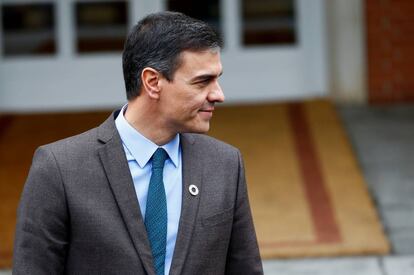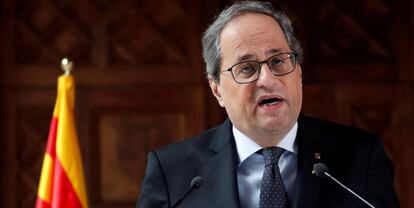Prime minister puts talks with Catalan premier on hold until after elections
The central government has committed to talks with politicians in Catalonia to discuss the future of the northeastern region within Spain

The Spanish government is postponing talks with the Catalan government on the future of the northeastern region until after elections are held there. That’s according to a statement released today by La Moncloa, the official residence and workplace of the prime minister, Pedro Sánchez.
The announcement came after Catalan premier Quim Torra said on Wednesday that elections would be called in the region after the budget plan had been passed by parliament. This could mean polls are held one or two months from now.
The government hopes to be able to start the said dialogue once the Catalan people have spokenStatement from La Moncloa palace
“The government hopes to be able to start the said dialogue once the Catalan people have spoken and a new parliament has been formed, as well as a government,” the statement from La Moncloa said. “As soon as the elections are held and there is a new government, we will start the dialogue.”
The talks were agreed between Sánchez’s Socialist Party (PSOE) and the Catalan Republican Left (ERC) in exchange for the latter group’s commitment to abstain at the prime minister’s investiture debate earlier this month in the lower house of parliament, the Congress of Deputies. The PSOE won the repeat general election of November 2019, but, as in April, the result was inconclusive and Sánchez needed the support or abstention of other parties to be voted back into power. A coalition government has been formed with the left-wing anti-austerity Podemos party, but the support of other groups is still needed in Congress for legislation to be passed.
The decision to postpone the talks was not well received by the ERC. Sergi Sabrià, the president of the party’s parliamentary group in parliament, called the move “total irresponsibility,” and “total non-compliance” with the agreement reached between the PSOE and the republicans. “We have no time to lose,” Sabrià wrote on Twitter on Thursday. “There are many months to go before the elections. Opening the political path is urgent.”
An independence drive has been ongoing in Catalonia for many years now, and reached its peak in 2017, when an illegal referendum on secession was held in October of that year, followed by a unilateral declaration of independence being passed by the Catalan parliament. Last year, nine pro-independence leaders were jailed for their role in the events of 2017, including ERC leader Oriol Junqueras, who was the deputy regional premier at the time.
Torra is considered by some opposition politicians to have already been stripped of his role as premier
PM Sánchez will still meet with Catalan premier Quim Torra on February 6, as was previously arranged, although the encounter is being framed by the government as “the necessary relationship between administrations to solve the urgent problems of Catalan society,” citing as an example the consequences of so-called “Storm Gloria,” which wreaked havoc last week across Spain and claimed the lives of more than a dozen people. “The government expresses its will to maintain that collaboration between the different ministries and will, of course, keep to the meeting with premier Torra next Thursday,” the statement continued.

Torra said that there would be fresh elections in Catalonia during a surprise institutional statement on Wednesday, after the Catalan parliament earlier this week decided to support a judicial ruling stripping the premier of his seat in the chamber. This move has evidenced a rift in the governing coalition, which is made up of the separatist parties Together for Catalonia (JxCAT) and the Catalan Republican Left (ERC), with the support of a smaller pro-independence group.
Torra on Monday refused to give up his seat in the regional parliament, ignoring decisions by the Supreme Court and the Central Electoral Board stripping him of his credentials after he was found guilty of disobeying electoral rules due to his refusal to take down banners supporting jailed pro-independence leaders during an election campaign. Torra is also facing being barred from public office, but for now is continuing his duties as premier. He is not, however, permitted to cast a ballot in votes in the regional parliament.
Sánchez has faced criticism for his plans to meet with Torra, who is considered by politicians such as the leader of the conservative Popular Party (PP), Pablo Casado, to have already been stripped of his role as premier due to the loss of his seat. Torra’s continuation as regional premier currently depends on the interpretation of the internal rules of the Catalan parliament, which ambiguously states that the regional chief should be “chosen among the deputies” in the chamber. The final decision on Torra’s political future is currently being considered by the Supreme Court.
English version by Simon Hunter.
Tu suscripción se está usando en otro dispositivo
¿Quieres añadir otro usuario a tu suscripción?
Si continúas leyendo en este dispositivo, no se podrá leer en el otro.
FlechaTu suscripción se está usando en otro dispositivo y solo puedes acceder a EL PAÍS desde un dispositivo a la vez.
Si quieres compartir tu cuenta, cambia tu suscripción a la modalidad Premium, así podrás añadir otro usuario. Cada uno accederá con su propia cuenta de email, lo que os permitirá personalizar vuestra experiencia en EL PAÍS.
¿Tienes una suscripción de empresa? Accede aquí para contratar más cuentas.
En el caso de no saber quién está usando tu cuenta, te recomendamos cambiar tu contraseña aquí.
Si decides continuar compartiendo tu cuenta, este mensaje se mostrará en tu dispositivo y en el de la otra persona que está usando tu cuenta de forma indefinida, afectando a tu experiencia de lectura. Puedes consultar aquí los términos y condiciones de la suscripción digital.








































